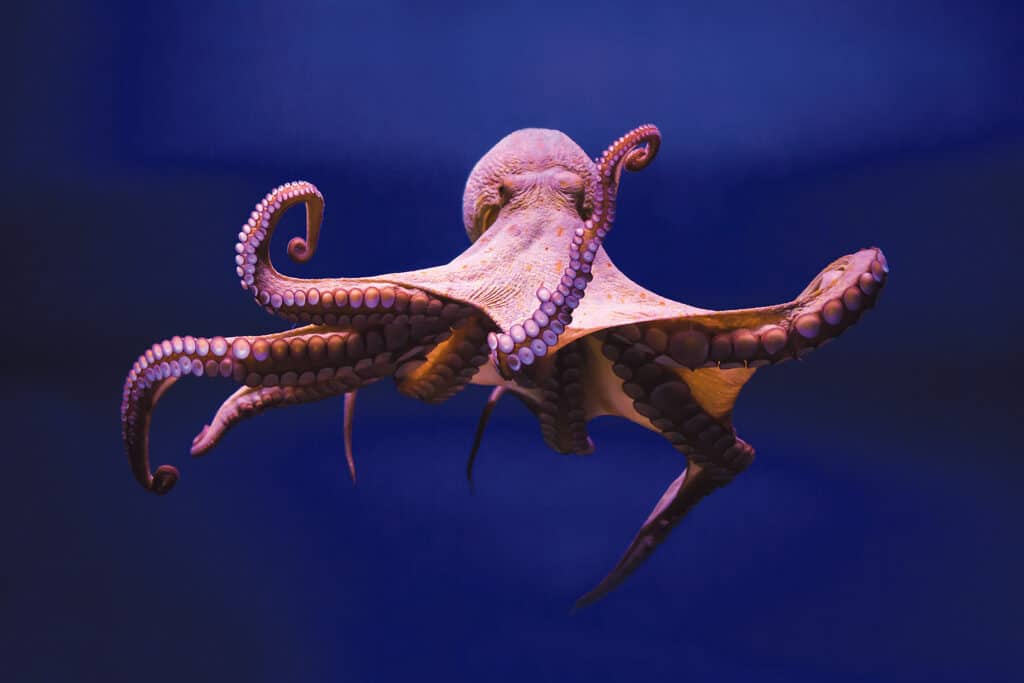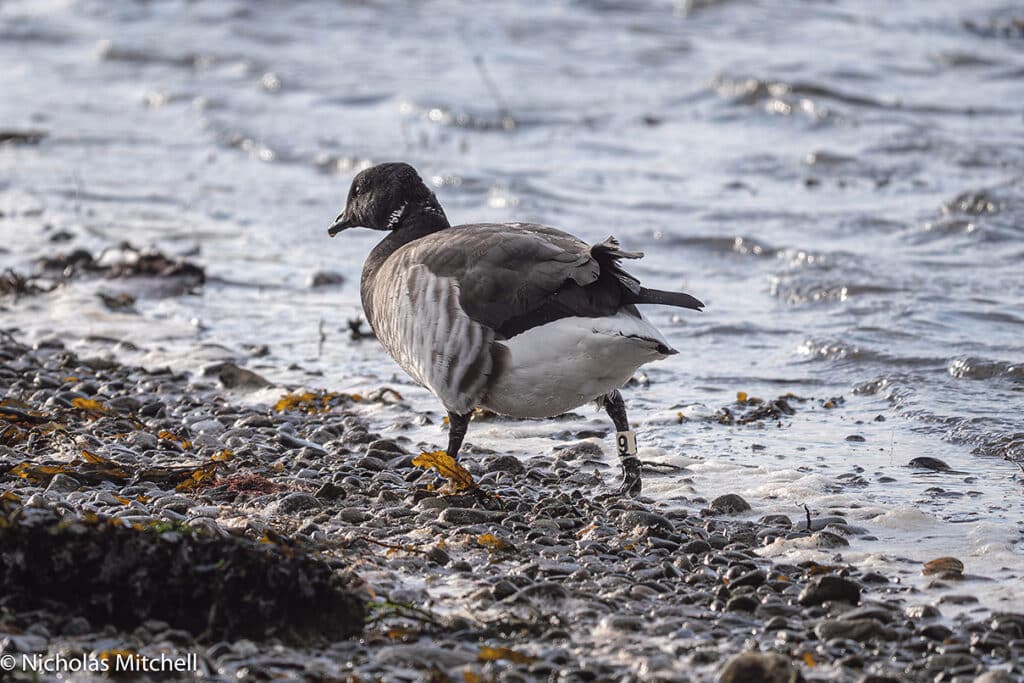
I once received a postcard from a friend in Greece which showed a fisherman bashing an octopus against a pier wall. Jane Grigson wrote, in her excellent ‘Fish Cookery’, that fishermen in the Mediterranean insist an octopus has to be beaten 99 times before it is fit for the pot. I knew a man who tenderised the poor animals by driving his car over them. Octopuses are tough, but they are also the most advanced of the invertebrates; their brain-to-body mass ratio is between that of reptiles and birds. Their intelligence has been compared to that of a cat. Such an animal should be admired and respected, not tortured.
I mention this because the Spanish company Nueva Pescanova is planning to start farming octopuses in the Canary Islands. This is not good news. Octopuses are territorial, anti-social creatures, spending most of their lives hiding alone in rocky crevices. They are recognised as “sentient beings” in the UK Animal Welfare (Sentience) Act 2022. They won’t like being imprisoned in crowded tanks. And the method of execution will be immersion in freezing water.
Nueva Pescanova claims their octopus farm will be humane, and will help wild populations that are being over-exploited. But I doubt that – fishermen will keep catching the wild ones (5,000 tonnes are caught annually in the north-west Spanish fishery alone) and as the farmed octopuses will be cheaper and more widely available, more people will want to eat them. The octopuses will be fed on fish, perhaps by-catch, but certainly fish that would have been food for some other wild animal.
Octopuses belong to the Phylum Mollusca, which consists of seven classes; four of these – the solenogasters, monoplacophorans, chitons and tusk shells – you are unlikely to be aware of. The other three groups are the Bivalvia – cockles, mussels, scallops and oysters; the Gastropoda, which include slugs, snails, limpets and periwinkles; and the Cephalopoda, literally “head-feet” – the squids, cuttlefish and octopuses (octopi is grammatically incorrect – the word comes from Greek, not Latin).
Thanks to their hard shells, molluscs have left an extensive fossil record. Cephalopods probably evolved from a limpet-like creature in the Cambrian Period (540 – 485 million years ago). The shell became taller and taller and the muscular foot turned into muscular arms, so the creature’s lifestyle changed from creeping, with the shell protecting it dorsally, to swimming, with the shell horizontal and arms outstretched. In many groups, the shell became spirally coiled. The best known of the fossil cephalopods are the ammonites, which resembled giant flat snails with many arms; they died out at the end of the Cretaceous Period, along with the dinosaurs. Another group with a coiled shell, the nautiloids, also dates back to the Cambrian, but one family, with about six species, including the beautiful pearly nautilus, survives to this day.
In the other living cephalopods, the shells are internal, greatly reduced or absent altogether. The shell of the cuttlefish, which have ten arms, is the familiar chalky “cuttlebone” often washed up on the shore. In the squids, also with ten arms, the shell is reduced to what looks like a thin, feather-shaped piece of plastic that only a chef or a scientist would ever see. The eight-armed octopuses have no shells at all, except for some deep sea forms, and the strange argonaut, the female of which builds a beautiful structure for brooding her eggs.
There are about 330 species of octopus, ranging in size from the giant Pacific octopus, which can have an arm span of six metres, to the star-sucker pygmy octopus, which grows to no more than two and a half centimetres. Octopuses are found in every ocean and in many different habitats, from tidal pools and coral reefs down to depths of more than 2,000 metres. The octopus most often caught in Ireland is the lesser octopus, Eledone cirrhosa, recognised by having just one row of suckers on its arms. Further south is the larger Octopus vulgaris – the one the Spanish are going to farm – which has two rows of suckers.
Octopuses have blue blood and three hearts – a main one and a pump for each of the gills. They don’t, as is often said, have nine brains, but they do have ganglia (nerve centres) in each arm, so they can use their arms without any instructions from the brain. If an arm is bitten off, it can be regenerated. They move by crawling, or, when speed is required, they can swim backwards by jet propulsion, squirting water out of their funnels. Their eyes are well developed, the structure not dissimilar to ours. Having no skeleton, they can squeeze into tiny spaces, and they are masters of camouflage – changing shape, colour and even the texture of their skin to evade detection. They can use shells, stones and seaweed to make hiding places.
Octopuses have sharp beaks, resembling those of parrots, situated in the centre of the ring of tentacles, and all possess poison glands for killing their prey, though only the four species of blue-ringed octopuses, found in the Indo-Pacific region, are deadly to humans.
Sex, like everything else about these animals, is strange and endearing: the male has a specially developed arm called the hectocotylus, which he uses, after a display of colour change or arm waving, to actually hand a package of sperm to his partner, placing it inside her mantle cavity, where fertilisation takes place. Sadly, he then dies. She lays her eggs – up to 400,000 in the case of the giant Pacific octopus – in her rocky den, and guards, oxygenates and cleans them until they hatch. This can take several months depending on the species, but all that time, the mother octopus doesn’t eat, and she too eventually dies. The delightfully cute baby octopuses, most of which won’t reach adulthood, never know their parents, so never learn anything from them; if they did, imagine what octopuses could achieve.
Most octopuses live only one or two years, though the giant Pacific species can live for five. Egg brooding and self-starvation which lead to this early death are controlled by hormones produced
in the optic glands, situated near the brain. Experimental removal of these glands results in an octopus eating again, and living longer.
Octopuses can rob lobster pots of bait and lobsters; they often get captured because they think the lobster pot is a good home. In the Mediterranean, fishermen used ceramic pots which the octopuses happily crawl into. They are caught by anglers accidentally – once hauled aboard, they turn red in anger, then, if left on deck, will match the colour of the boat. When released, they swim off in a cloud of ink.
In captivity, octopuses have been known to escape from their tanks, travel across floors and into other tanks containing crabs or fish, and after a good feast, return to their own tanks. They can open screw-top jars and solve puzzles; one was able to cause short circuits by climbing out of his tank and squirting water at the overhead lamp. They have short and long-term memories and can recognise individual people. And who could forget Paul, the German octopus oracle? He correctly predicted the results of the World Cup in 2010, before dying in his tank, aged two and a half. A clairvoyant octopus in Japan was equally successful in the 2018 World Cup, but afterwards, he was eaten. (Their success was, of course, pure chance).
Octopus as food was not, until recently, especially popular in Ireland, but then I remember a time when there was hardly a local market for edible crabs, let alone octopuses. We don’t need to eat octopuses, but I fear that inexpensive farmed octopus will, like farmed salmon, turn a luxury into a commonplace food item, while adding to the environmental problems inherent in the aquaculture industry, and inflicting yet more suffering on one of our most charming and intelligent fellow creatures.
To those still planning to create their own pulpo a la gallega, or perhaps htapothi krasato, and so remind themselves of sunny holidays in Spain or Greece, I suggest watching Craig Foster’s wonderful film ‘My Octopus Teacher’. If you have any heart at all, you will never eat octopus again.



